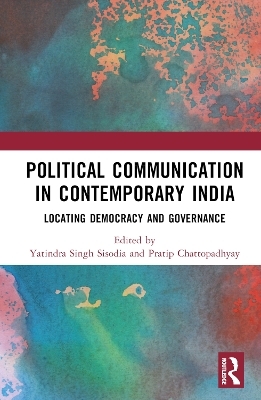
Political Communication in Contemporary India
Routledge India (Verlag)
978-0-367-68792-2 (ISBN)
This book explores the forms, patterns, and trends in political communication in India in the twenty-first century. It underlies the influence of context in political messaging laying bare its complex, overlapping, and multidimensional structures.
The volume:
Examines how political decision-making is shaped by media — through political speeches, community opinion leaders, and formal and informal public conversations.
Explores a range of political communication channels— from community radio to social media.
Presents an overview of the problems associated with message designing and message dissemination through communication channels in a political setting.
Highlights how political communication impacts critical aspects of democracy and governance and goes beyond mere rhetoric.
A comprehensive work on the production, diffusion, transmission, and impact of information in a political environment, this book will be of great interest to scholars and researchers of politics, governance, democracy, media and communication studies, journalism, cultural studies, and South Asian studies.
Yatindra Singh Sisodia is Professor and Director, Madhya Pradesh Institute of Social Science Research, Ujjain (an ICSSR Institute). His areas of research interest are democracy, decentralised governance, electoral politics, tribal issues, and developmental issues. He has been conferred with Professor G. Ram Reddy Social Scientist Award (2017). He has authored/edited 20 books, including Electoral Dynamics in the States of India (Routledge, 2021); Social Inclusion of Marginalised in India (Rawat, 2021), Strategies for Human Development and People’s Participation in Rural India (Primus, 2020); How India Votes (OBS, 2019); Two Decades of Panchayat Raj in India (Rawat, 2017). He is Editor of Madhya Pradesh Journal of Social Sciences and Madhya Pradesh Samajik Vigyan Anushandhan Journal. He has extensively written in refereed journals and participated in academic events. He has completed numerous government-funded research projects for various central ministries, state ministries, and organisations like ICSSR, Planning Commission, and ISRO. He has made academic visits to the USA, under IVLP; the UK; South Korea; Malaysia; Dubai; and Bangladesh. Pratip Chattopadhyay is Senior Assistant Professor, Department of Political Science, University of Kalyani, West Bengal. He obtained his PhD from the University of Calcutta on the position of Marxist political parties on Indian foreign policy (1991-2009). He was Associate of UGC-IUS at IIAS Shimla from 2014 to 2016, and Executive Committee Member West Bengal Political Science Association from 2013 to 2022. His latest book is titled Domestic Roots of Indian Foreign Policy: Experiences of Marxist Political Parties in UF (1996-98) and UPA (2004-08) Government. He has extensively written in refereed journals and participated in academic events. He has made academic visits to Montreal, Canada in 2014 to present paper in 24th International Political Science Association Congress and was invited to deliver lectures on issues of West Bengal politics, an Indian politics in University of Dhaka, Jahangirnagar University, Begum Rokeya University, and Barishal University in Bangladesh between 2016 and 2019.
1. Political Communication in Contemporary India: An Introduction Part I: Theoretical Approaches to the Study of Political Communication 2.Governance in Post-Liberalisation India: The Grey Zone of Political Communication 3. Democracy, Public Sphere and Participation in India: A Philosophical Enquiry Through the Theory of Communicative Action of Habermas Part II: Political Communication During Elections 4. Uttar Pradesh: Political Communication Strategies of Mayawati and Akhilesh 5. Changing Dynamics of Political Electioneering in India: Use of New Social Media in Karnataka Assembly Elections 2018 Part III: Cultural and Linguistic Dimension of Political Communication in Indian Democracy 6. Rhetoric in Democracy: Inventing and ReInventing Language for Identity Politics 7. Personalisation of Politics: Shifting Paradigm of Democracy in Digital Age 8. Theorizing Communication of Electoral Slogans in Indian General Election- A Case Study Part IV: Federal and Administrative Dimension of Political Communication 9. Between ‘National’ and ‘Federal’ Communication: Locating the Issue of Bangladeshi Migrant in West Bengal since 2014 10. Locating the ‘Citizen’ in Administrative Communication in India: A Case Study of ‘Mission Nirmal Bangla’ 11. Panchayat Elections and Political Communication: A Study from Gram Panchayats of Telangana State Part V: Diversity in Political Communication in Contemporary India 12. Gleaning Political Communication through ‘Notices’ in North East India 13. Whose Communication is it Anyway?: Analysing Socio-Political Debates in Indian Tele-media 14. Negotiating the Political in the Community Radio Landscape in India: A Brief Sketch 15. Democratising Political Communication for Governance in the New Normal Times. Index
| Erscheinungsdatum | 07.11.2022 |
|---|---|
| Zusatzinfo | 1 Line drawings, black and white; 1 Illustrations, black and white |
| Verlagsort | London |
| Sprache | englisch |
| Maße | 156 x 234 mm |
| Gewicht | 512 g |
| Themenwelt | Naturwissenschaften ► Geowissenschaften ► Geografie / Kartografie |
| Sozialwissenschaften ► Politik / Verwaltung | |
| Sozialwissenschaften ► Soziologie ► Spezielle Soziologien | |
| ISBN-10 | 0-367-68792-5 / 0367687925 |
| ISBN-13 | 978-0-367-68792-2 / 9780367687922 |
| Zustand | Neuware |
| Haben Sie eine Frage zum Produkt? |
aus dem Bereich


